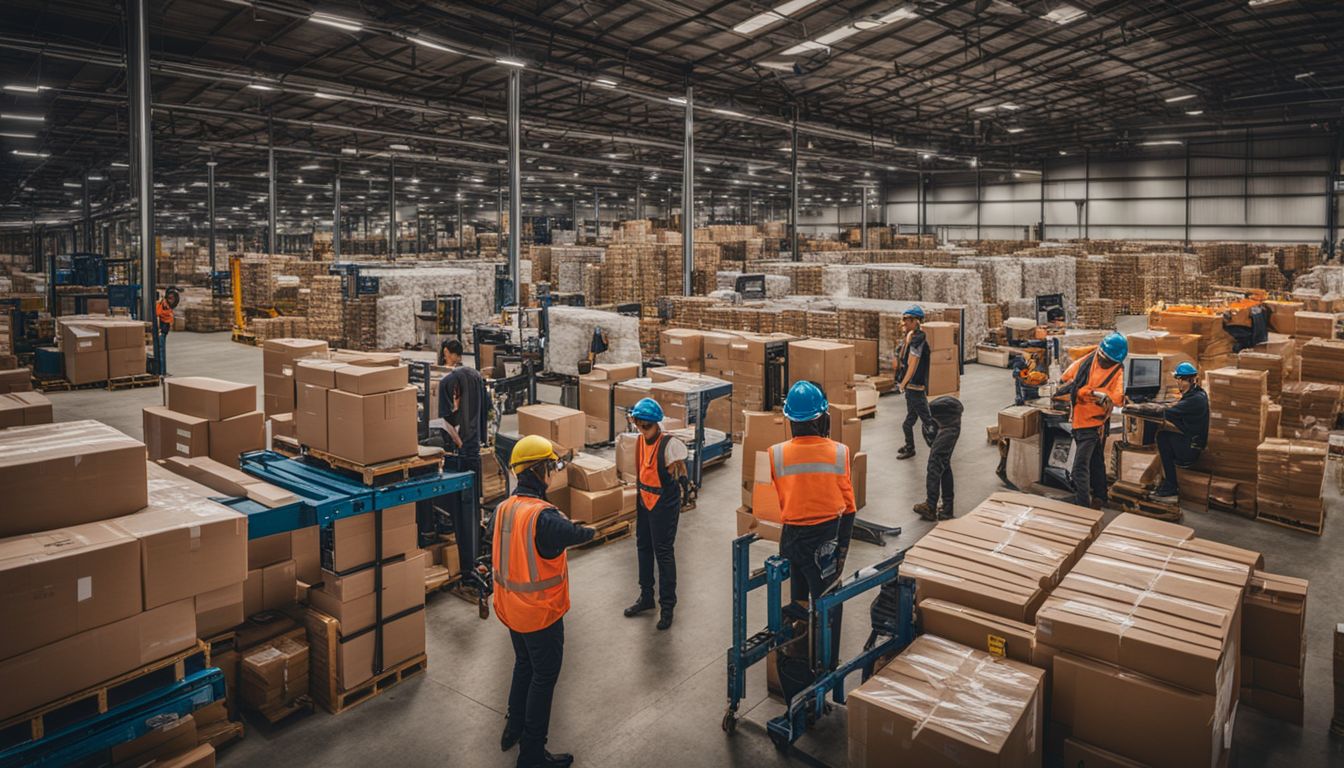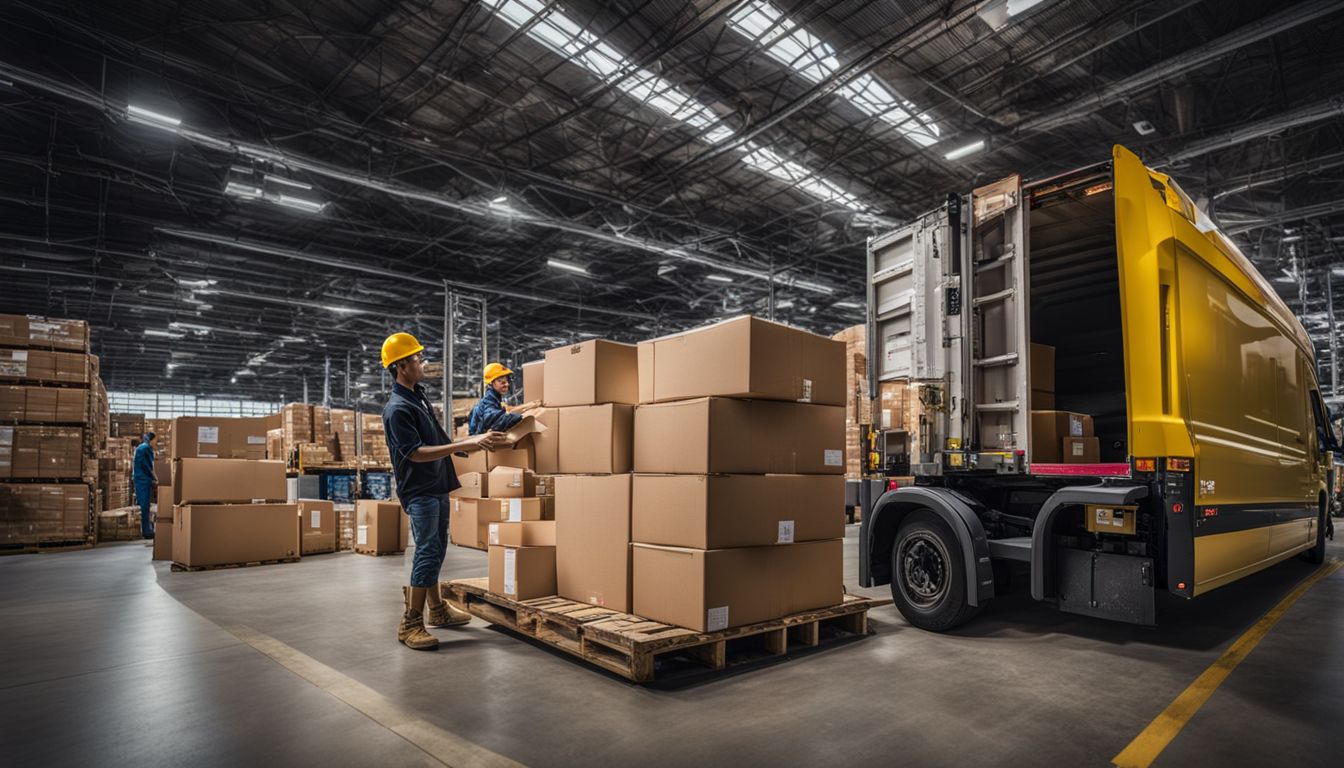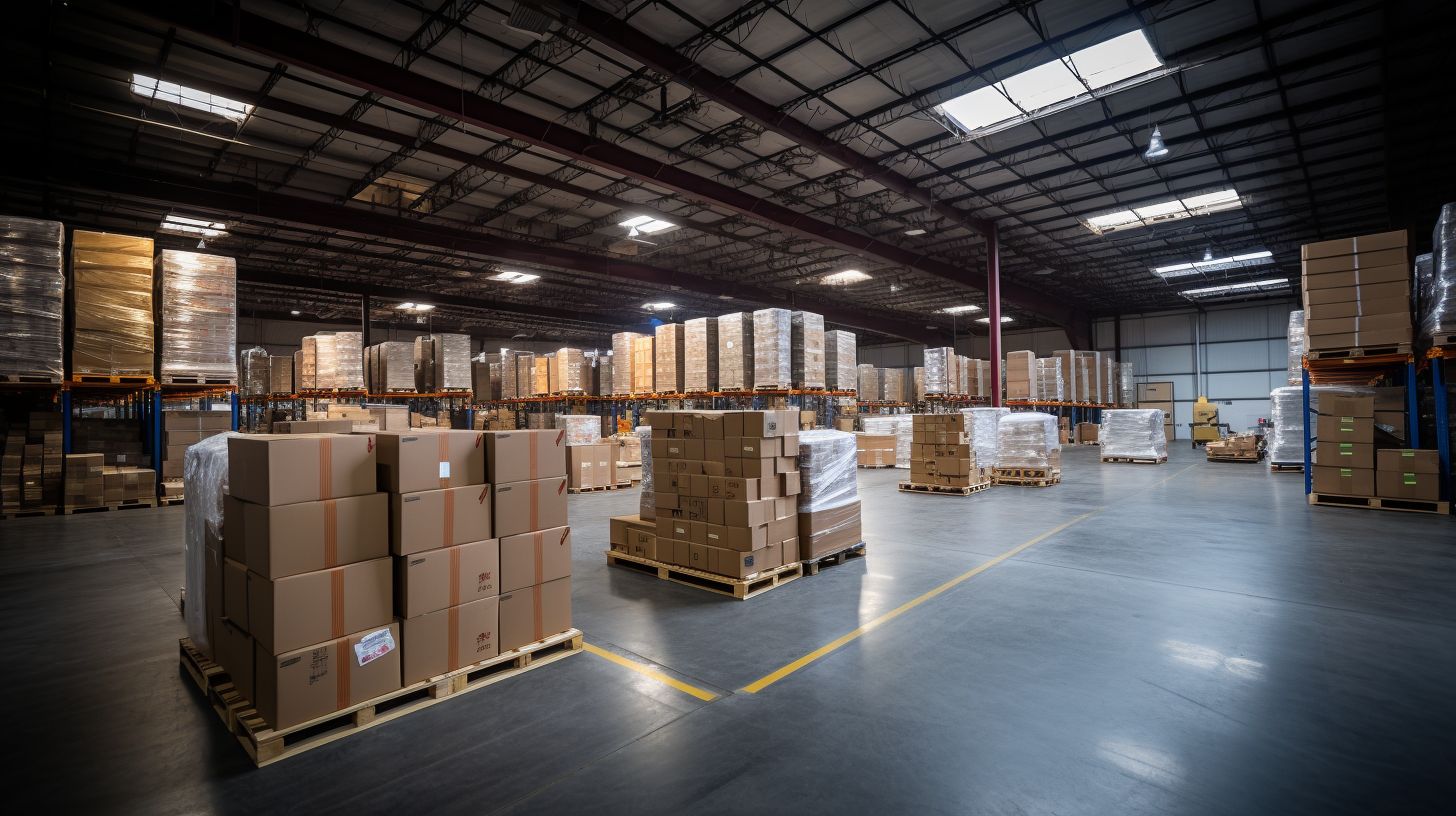Understanding the Varied Types of Logistics for E-commerce and Identifying Their Key Differences
In the bustling world of online shopping, getting products to customers quickly is a big challenge. E-commerce logistics are essential in moving goods from suppliers to buyers’ front doors.
Our blog will guide you through different logistics types and their unique benefits for your e-commerce business, making it easy for you to choose what’s best. Keep reading for key insights that could transform your delivery game!
Understanding E-commerce Logistics

Diving deeper into e-commerce logistics, it’s the backbone that supports online stores from the moment a customer places an order until they receive their package. This process isn’t just about moving items; it’s a complex orchestration of supply chain management, warehousing, inventory management, and last-mile delivery—all aimed at maximizing efficiency and customer satisfaction.
Logistics services must be smooth to keep customers returning to your e-commerce platform for more purchases.
Effective logistics management helps ensure that stock levels are always in sync with what’s presented on the online store’s interface. It allows sellers to send out products swiftly without any hitches that could tarnish the brand’s reputation.
Moreover, choosing the right third-party logistics providers can make or break how quickly and accurately orders are fulfilled. Brands nowadays don’t just compete with prices—they compete with shipping times too.
Therefore, mastering e-commerce logistics is crucial for businesses aiming to thrive in today’s fast-paced digital marketplace where buyers expect quick response and seamless service from start to finish.
Types of E-commerce Logistics

E-commerce logistics are crucial for ensuring products reach customers efficiently. They encompass various methods, each with distinct features and benefits.
- In-house Logistics:
- Third-party Logistics Providers (3PL):
- Dropshipping:
Components of the E-commerce Logistics Process

The e-commerce logistics process is a complex system that ensures products reach customers efficiently. It involves several key components, each playing a crucial role in moving goods from suppliers to consumers.
- Suppliers are the starting point of the e-commerce supply chain, providing the necessary merchandise to be sold online.
- Fulfillment centers store products and prepare them for shipment; these are integral hubs where inventory is managed and orders are processed.
- Distribution centers serve as strategic points where goods are received from suppliers and sent out to various fulfillment centers.
- Sorting centers take on the task of organizing packages for delivery, ensuring that items go to their correct destinations.
- Shipping carriers are responsible for the transport of products, offering services like same-day delivery to meet customer expectations.
- Packaging and labeling practices protect items during transit and provide important information like content description and handling instructions.
- The return process, or reverse logistics, handles items sent back by customers, emphasizing reuse or proper disposal of returns.
- Route planning software helps optimize travel paths for delivery vehicles to save time and reduce fuel consumption.
- Point-of-sale (POS) systems at brick-and-mortar retail locations integrate with online operations, syncing inventory levels and sales data across channels.
Best Practices for E-commerce Logistics
Building on the components of the e-commerce logistics process, implementing best practices ensures a streamlined operation that can lead to better profit margins and customer satisfaction. E-commerce businesses thrive by adopting strategies that enhance efficiency and reliability in their logistics. Here are some recommended best practices:
- Optimize inventory management to strike the right balance between demand and supply, avoiding both overstocking and stockouts. Efficient inventory systems track product levels in real-time, ensuring that all items are available for shipping when orders come through.
- Invest in advanced technology like artificial intelligence (AI) and deep learning to forecast demands accurately. This helps with planning for peak seasons or sales events by aligning the inventory accordingly.
- Choose the right logistics service provider who can offer customized solutions tailored to your business needs – whether it’s flat-rate shipping, quick delivery options, or handling special items.
- Develop a user-friendly e-commerce website with an integrated point-of-sale (POS) system that streamlines order processing and enhances customer experience.
- Implement scalable warehouse management systems that support growth and help maintain efficient operations as order volumes increase.
- Foster strong relationships with vendors to ensure you have quality packing materials which are crucial for protecting products during transit.
- Embrace eco-friendly packaging solutions without compromising on product safety; this not only helps the environment but also resonates well with customers.
- Standardize packing processes across all orders to maintain consistency, reduce errors, and expedite dispatch times from the warehouse.
- Offer multiple delivery options including alternative pickup points like local post offices or brick-and-mortar stores which may provide convenience for customers.
- Incorporate effective route planning software, enabling quicker response times for deliveries while saving on transportation costs through route optimization.
- Streamline returns policy making it clear and easy for customers to understand. This includes investing in a reverse logistics system that simplifies return procedures, fostering trust, and potentially increasing repeat purchases.
- Use data analytics tools to assess various aspects of e-commerce retail logistics performance. These insights aid in making informed decisions about routing, scheduling, pricing strategies, and more.
- Prepare for seasonal surges by employing temporary employees or utilizing third-party logistics providers (3PLs) that can flexibly adjust resources based on demand fluctuations.
Advantages of Using E-commerce Logistics Solution
E-commerce logistics solutions provide businesses with the advantage of streamlined operations, improved scalability, and enhanced customer satisfaction. With efficient route planning and delivery services, e-commerce companies can optimize their supply chain diversification while reducing surcharges.
Utilizing an e-logistics solution also allows for better tracking and management of inventory, contributing to cost savings through economies of scale.
Moreover, by leveraging valuable insights from the data collected through e-commerce logistics processes, businesses can enhance their marketing strategies and branding efforts. This not only creates a competitive advantage in the market but also helps in transforming the overall customer experience.
As a result, using e-commerce logistics solutions offers businesses a strategic edge in today’s dynamic retail landscape.
NextHeading: “7. Challenges in E-commerce Logistics”.
Challenges in E-commerce Logistics
E-commerce logistics face challenges such as managing inventory across multiple platforms and providing consistent customer experiences. Ensuring the accuracy of orders and minimizing shipping errors are crucial to maintaining customer satisfaction and loyalty.
Additionally, meeting delivery expectations in a timely manner poses another challenge for e-commerce logistics, especially during peak seasons or unexpected spikes in demand.
Balancing cost-effective shipping solutions with fast delivery times is essential for e-commerce businesses to remain competitive. Managing returns efficiently without impacting overall operational costs is also a significant challenge in e-commerce logistics.
Furthermore, navigating complex international shipping regulations and customs requirements can be daunting for businesses looking to expand into global markets.
As technology continues to evolve, staying ahead of industry trends and implementing innovative solutions while addressing data privacy concerns remains an ongoing challenge for e-commerce logistics providers.
Moving on from these challenges, let’s explore how best practices play a pivotal role in enhancing efficiency within the e-commerce logistics process.
Conclusion
In conclusion, understanding the diverse logistics options for e-commerce is crucial for businesses. Identifying the key differences between in-house logistics, third-party providers, and dropshipping allows companies to make informed decisions.
Implementing best practices such as efficient route planning and backup supply chain strategies is essential for meeting customer demands in the rapidly evolving e-commerce landscape.
Choosing the right logistics partner is pivotal for success in the competitive world of online retail.
Anyone can join.
Anyone can contribute.
Anyone can become informed about their world.
"United We Stand" Click Here To Create Your Personal Citizen Journalist Account Today, Be Sure To Invite Your Friends.
Please Help Support BeforeitsNews by trying our Natural Health Products below!
Order by Phone at 888-809-8385 or online at https://mitocopper.com M - F 9am to 5pm EST
Order by Phone at 866-388-7003 or online at https://www.herbanomic.com M - F 9am to 5pm EST
Order by Phone at 866-388-7003 or online at https://www.herbanomics.com M - F 9am to 5pm EST
Humic & Fulvic Trace Minerals Complex - Nature's most important supplement! Vivid Dreams again!
HNEX HydroNano EXtracellular Water - Improve immune system health and reduce inflammation.
Ultimate Clinical Potency Curcumin - Natural pain relief, reduce inflammation and so much more.
MitoCopper - Bioavailable Copper destroys pathogens and gives you more energy. (See Blood Video)
Oxy Powder - Natural Colon Cleanser! Cleans out toxic buildup with oxygen!
Nascent Iodine - Promotes detoxification, mental focus and thyroid health.
Smart Meter Cover - Reduces Smart Meter radiation by 96%! (See Video).






